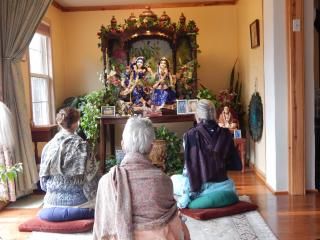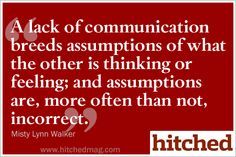Tattva-viveka
The Negative Undercurrent in Communities—Acknowledging and Dealing with Relationship Conflicts
Karnamrita Das - July 30, 2015 3:20 pm
Our current push to have more devotee involvement the direction of the sanga and to create devotee care is to help minimize the negative undercurrent in our group and to be able to deal with conflicts and disagreements in the most useful, respectful, and healthy way.
This last Thanksgiving day at our small country temple we decided to have a day of japa as a way to show our gratitude for the holy name and those gurus who have given it to us. This is a practice we used to do monthly and are hoping to revive. During such occasions I’m reminded of the many japa retreats I’ve attended where participants were totally absorbed in japa, kirtan, and hearing about the Krishna conscious philosophy from saintly persons in front of beautiful Deities and our many gurus—in other words, the main practices of bhakti.
Some devotees chant 64 rounds, though the main emphasis is to increase our number of rounds beyond what we have vowed to chant, in the mood of surrender, praying for perfection, and to glorify the Lord and his devotees. We also share together at the end of our chanting what our struggles, positive experiences, and realizations were. I often write about whatever has come to me through the experience and this blog is based on those thoughts. My feelings and awareness during this time were also influenced by some serious drama and difficulties in devotee dealings over the last 6 months.
During the day I was appreciating how such regular shared spiritual practices bring the devotees closer together. There was obvious unity among the participants, at least observably. In theory we were also internally united in terms of our goal to perfect our lives by the holy name and Vaishnava seva. In addition to the power of sharing our spiritual practices, I was reminded that it is really our good will and affection toward one another that is the foundation of being able to harmoniously come together.
Theory alone does not make a harmonious group or community. With good relationships and open hearts we can share what is most important and can speak our mind even when there are differences or issues to be resolved. Of course, this is easier said than done, and it requires a constant endeavor for openness and kindness in the face of inevitable changes and new situations and members. Having an environment that fosters honest communication is essential as is shared faith in a saintly person and inspirational leader. At the same time, everything comes down to each individual endeavoring to be as balanced and spiritually strong as possible. We endeavor for what we value, and if we value an atmosphere of honesty, openness, and progressive spiritual life, we will work for that and encourage our peers. Thus undercurrents in a community have a direct correlation with the individual member's personal undercurrents (see next blog) and whether such issues are being addressed in the community.
When good communication and regular appreciation aren’t shared there is bound to be an undercurrent of dissatisfaction, or worse, even feelings of anger and resentment. In a particular sanga, or group of devotees, the individuals have strengths and shortcomings, but if we become a harmonious team we help encourage one another in our personal growth and devotional goals; where one person falls short, another can provide that skill or need. An uplifting transcendent atmosphere based on good will, mutual respect, affection, and devotion, creates synergy and forward motion in spiritual progress, helping us deal with interpersonal conflicts which are bound to exist. In a sense the way we deal with difficulties or problems defines our success or failure, as that can really test our resolve to work together, or merely defend ourselves and criticize. By not ignoring challenges—which is often the easiest thing to do—but by working together to turn problems into service opportunities, we become stronger as individuals and as a group
.
I have seen how open communication is complicated when one or more devotees have major unresolved life issues or undiagnosed mental health problems. At the same time even those with average mental health can have blind spots and emotional wounds that can be triggered by certain people. This fact brings up of the need, as I have shared before, for trained devotee counselors who are also advanced devotees. We need competent mediators or counselors to help discover hidden or ignored conflicts and to resolve interpersonal problems—some way to assess the spiritual health of the group or community. Part of our spiritual progress comes from focused introspection to be aware of our personal strengths, weakness, and blind spots, and that our culture as devotees stresses continual work to improve ourselves psychologically and spiritually. Healthy communities depend on individuals who are balanced, happy, and spiritually strong.
If problems and conflicts within the sanga, or between the sanga members and others, are not addressed and the undercurrent becomes like a raging storm, it can affect the atmosphere or energy of the community or temple. Such energy might be considered the pulse of the community which, as in the diagnostic methods of Ayurveda and Chinese medicine, by feeling it, reveals overall health. Although not visible to one’s eyes, many people can feel the turbulent subtle atmosphere, or undercurrent, being attracted or disturbed accordingly.
Problems, or in this analogy, health issues, are best addressed in the beginning when they are small and easier to improve. Sometimes it takes persons from outside the community to point out the negative undercurrent, or misunderstandings that must be addressed, since when we are too close to problems or conflicts we can miss them. Insight comes from detachment or distance from the problem coupled with prayer and positive intention, while attachment to one side of the story can cloud our vision and keep us stuck.
Reflecting back on relationship challenges, I know that regardless of whom we might like to blame, everyone has to take responsibility for them, and, as difficult as it often is, work toward a solution for everyone’s benefit! If only others are to blame then we remain a victim, others the evil doer, and there is no chance for personal growth through introspection. Introspection can help us become aware of and root out our faults or “anarthas”— unwanted habits unfavorable for bhakti, or even the mode of goodness.
In my experience, relationships seem especially designing to act as mirrors for us to notice our major life issues and lessons. Thus ideally, when we are confronted with conflicts, we can learn to welcome the opportunity to gain feedback about the state of our spiritual progress. I am not speaking as a master, but as someone trying to improve. We teach what we most need to learn, and chanting the holy name can help us gain perspective. With a vision of our material deficiencies we can humbly beg to change in order to realize our spiritual potential and improve our relationships and impact on our sanga or community.
What about in your community or group—is there an undercurrent that needs to be addressed? And if so, what can you do to help?
Vrajabhumi - November 14, 2015 11:22 am
There are clearly some vital and practical considerations severely lacking in devotional communities today.
"This fact brings up of the need, as I have shared before, for trained devotee counselors who are also advanced devotees. We need competent mediators or counselors to help discover hidden or ignored conflicts and to resolve interpersonal problems—some way to assess the spiritual health of the group or community. Part of our spiritual progress comes from focused introspection to be aware of our personal strengths, weakness, and blind spots, and that our culture as devotees stresses continual work to improve ourselves psychologically and spiritually. Healthy communities depend on individuals who are balanced, happy, and spiritually strong."
I've been seeing (and feeling) this for many years. It's encouraging to see so much sincere effort on your part, dear prabhu, to address these important but sensitive matters, within the context of sustainable community that is centered around spiritual growth.
Currently there are countless false notions and misconceptions flying around about the nature of emotional wellness and healthy relationships. Because many of these ideas and assumptions are very common, they tend to be viewed as "substantiated". I don't think it would hurt any of us at all to have our understanding of psychology expanded and deepened some -- especially in terms of how it relates to our spiritual practice and development.
The biggest challenge I tend to encounter when approaching these matters, is in bringing up misconceptions that have been generated and engrained in us via TV, movies, songs and other popular worldly media. The usual outcome is, when one begins to see that it may pertain to their own personal social conditioning, they feel criticized and judged because they have been identifying with a particular view, and that view is now under critical scrutiny. Thus feeling personally attacked, the most common tendency then is to take to the offensive, and start criticizing back.
All of this occurs in response to a general statement, regarding objective observations, which were never directed toward any specific individual.
Nevertheless, I feel that past social/cultural conditioning is a very relevant and crucial place to start in the direction of self-improvement, and learning to respond to others' shortcomings (or 'apparent' shortcomings)' in ways that are more beneficial to them, to ourselves, and for the Harmony of the greater community.
Thank you so very much for taking the time to carefully address and outline this too often neglected/misunderstood necessity within our communities.






